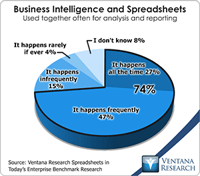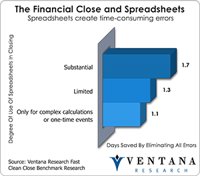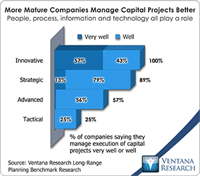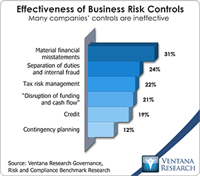At this year’s Inforum user group conference, Infor representatives showed the progress the organization has made since last year in transforming itself from a ragbag of mostly small, often obsolete software companies to a competitive vendor of a modern enterprise management software suite. Infor was created by private equity investors employing a “rollup” strategy, aimed at combining smaller companies within an industry to form a single larger company that could achieve economies of scale and...
Read More
Topics:
Big Data,
Mobile,
Planning,
Social Media,
GRC,
Office of Finance,
Operational Performance Management (OPM),
Budgeting,
closing,
Analytics,
Business Analytics,
Business Collaboration,
Cloud Computing,
Collaboration,
Business Performance Management (BPM),
CFO,
Customer Performance Management (CPM),
Financial Performance Management (FPM),
Infor,
Information Management (IM),
IT Performance Management (ITPM),
Risk,
Sales Performance Management (SPM),
Supply Chain Performance Management (SCPM),
Workforce Performance Management (WPM),
FPM,
SEC
The International Integrated Reporting Council (IIRC) recently published a draft framework outlining how it believes businesses ought to communicate with their stakeholders. In this context the purpose of an “integrated report” is to promote corporate transparency by clearly and concisely presenting how an organization’s strategy, governance, and financial and operational performance will create value for shareholders and other stakeholders in both the short and the long term. Such a report...
Read More
Topics:
Sustainability,
Office of Finance,
closing,
XBRL,
Business Analytics,
Business Intelligence,
Information Applications (IA),
Information Management (IM),
financial reporting,
FPM,
SASB,
SEC
I’ve been using spreadsheets for more than 30 years. I consider this technology tool among the five most important advances in business management of the 20th century. Spreadsheets have revolutionized many aspects of running an organization. Yet as enthusiastic as I am about them, I know the limits of desktop spreadsheets and the price we pay if we fail to respect those limits. The essential problem arises when people use desktop spreadsheets for purposes beyond what they were originally...
Read More
Topics:
Office of Finance,
Operational Performance Management (OPM),
Reporting,
enterprise spreadsheet,
Analytics,
Business Analytics,
Business Intelligence,
Governance, Risk & Compliance (GRC),
Visualization,
Business Performance Management (BPM),
Customer Performance Management (CPM),
Financial Performance Management (FPM),
Information Applications (IA),
Information Management (IM),
Risk,
Sales Performance Management (SPM),
Supply Chain Performance Management (SCPM),
Workforce Performance Management (WPM),
benchmark,
Financial Performance Management
For four years Adaptive Planning has been building out its cloud-based financial software. Starting with budgeting, planning and forecasting, it added analytics, data visualization, dashboards and alerting as well as flexible reporting and collaboration tools. It recently announced the general availability of consolidation functionality in its cloud-based suite. This addition eliminates a notable gap in the company’s functionality, giving it a more complete financial performance management...
Read More
Topics:
Office of Finance,
close,
Consolidation,
Controller,
Cloud Computing,
Business Performance Management (BPM),
CFO,
Data,
Financial Performance Management (FPM),
Financial Performance Management
Ventana Research recently completed an in-depth benchmark research project on long-range planning. As I define it, long-range planning is the formal quantification of the more conceptual strategic plan. It makes specific assumptions and expresses in numbers how a company expects its strategy will play out over time. Almost all (95%) of those participating in the research see a need to make improvements to their long-range planning process. The research shows that one useful improvement is ...
Read More
Topics:
Big Data,
Performance Management,
Planning,
Office of Finance,
Operational Performance Management (OPM),
Reporting,
Business Analytics,
Business Performance Management (BPM),
CFO,
Customer Performance Management (CPM),
Financial Performance Management (FPM),
Sales Performance Management (SPM),
Supply Chain Performance Management (SCPM),
Workforce Performance Management (WPM),
CEO,
Financial Performance Management,
FPM
A recent news release by Robert Half, a staffing company that specializes in accounting and finance personnel, covered what it sees as the most important attributes required for auditors in the 21st century. “7 Attributes of Highly Effective Internal Auditors” covers the people dimension of the profession and focuses on the non-technical requirements of the role, including relationship-building, teamwork, and diversity. No doubt these skills are a must for just about anybody working in a modern...
Read More
Topics:
Fraud,
Governance,
GRC,
Office of Finance,
audit,
Analytics,
Business Analytics,
Governance, Risk & Compliance (GRC),
Business Performance Management (BPM),
compliance,
Financial Performance Management (FPM),
Infor,
Risk,
HANA,
Oversight Systems
SAP recently announced its new Fraud Management analytic applications. Currently in “controlled” (limited) release, it’s a promising start for the product and a good example of the type of business process revolution that’s possible when companies can execute complex analytics on big data sets using in-memory and other advanced processing techniques. Over the next several years a wide swath of basic corporate processes will be transformed by the shift to in-memory processing and big data...
Read More
Topics:
SAP,
Fraud,
Governance,
GRC,
Office of Finance,
audit,
Analytics,
Business Analytics,
Governance, Risk & Compliance (GRC),
Business Performance Management (BPM),
compliance,
Financial Performance Management (FPM),
Risk,
HANA















